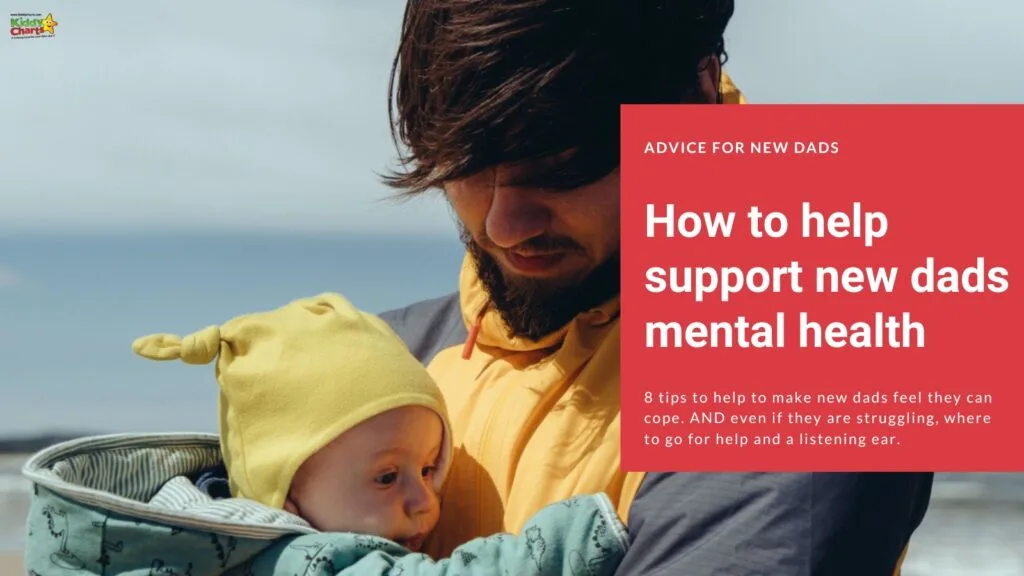The arrival of a new baby is a joyous and exciting time for parents. However, amidst the celebration and happiness, it’s crucial to remember that both new moms and dads can experience challenges with their mental health during this period of transition. While there is significant awareness surrounding postpartum depression and anxiety in mothers, fathers’ mental well-being can be overlooked.

This article aims to highlight the importance of supporting new dads’ mental health, fostering empathy towards them, and encouraging open conversations about their feelings and experiences.
Understanding father’s mental health challenges
New fathers can undergo a range of emotions as they adjust to their role as a parent. They may feel overwhelmed, anxious, or even depressed due to sleep deprivation, financial pressures, relationship changes, and adapting to the responsibilities of parenthood. According to the American Psychological Association, approximately 10% of new dads experience paternal postpartum depression, a condition that can significantly impact their mental health and overall well-being.
In the UK, a study conducted by the National Childbirth Trust (NCT) found that 1 in 3 new fathers (38%) are concerned about their mental health during the postnatal period (the first year after their child’s birth). This statistic also underscores the need for increased awareness and support for new dads facing mental health challenges as they navigate parenthood.
We have covered some of the challenges faced by Dads already on the site. We have articles with practical tips for encouraging them to help after the birth, 10 ways they can get involved in pregnancy, and even Dadvice for becoming Dad.
However, we haven’t touched on their mental health before, so…
1. Empathising with new dads
To support new dads, it’s essential to approach them with empathy and understanding. Acknowledge the challenges they face and validate their feelings by offering a listening ear or expressing concern for their well-being. Remember that they are also adjusting to their new role and may need time and support to navigate the changes in their life. Yes, mum is important, and particularly needs time to adjust physically as well as mentally. But there is also a transition period for dads too, and we don’t want their feelings and needs to be overlooked. It can be hard to come to terms with their new role, and the new addition to the family, and how that effects their relationship. Listening to them is a step ion the right direction. It helps to learn to listen to understand, rather than listening to offer advice, your thoughts, etc.
Sometimes dads need someone to get what’s happening to them too.

2. Provide some practical help
Offering practical help can go a long way in easing the burden on father’s mental health. We often think about mum here, offering special gifts for them, and giving them more time. It is also worth thinking about dad as well.
Small, simple gestures can go a long way, such as preparing meals, helping with advice on budgeting, household / diy chores that perhaps have dropped off the radar, or babysitting might help. These gestures can provide dads with much-needed respite and time to focus on their own mental health.
You can also encourage them to seek professional help if they are struggling with depression, anxiety, or other mental health concerns.
It is also worth noting that is IS perfectly normal to experience ups and downs within our mental health after the birth, and any significant life events. Mental health is a continuum, and charges from day to day, just as our emotions fluctuate too.

3. Encourage open discussion about struggling
One of the most effective ways to support new dads’ mental health is by encouraging them to talk openly about their feelings and experiences. Create a safe and non-judgmental space for them to express their thoughts without fear of being dismissed or ridiculed. Normalise conversations about mental health and remind them that seeking help is a sign of strength, not weakness.
Unfortunately, there does seem to be a perception that it isn’t something we should be doing talking about our struggles or weaknesses.
Despite the trend to popularise It’s Ok to not be OK, there is still a fear of actually reaching out and talking. Paying lip service to this isn’t going to help reduce the stark rates of suicide in men.
We need to listen, and reach out if we feel that there is a change in those that we care about. Sometimes just being available and a listening ear is what is needed to help raise someone’s mood.

4. Connect with other dads so they have someone to talk to
Encourage new dads to connect with other fathers who can provide valuable advice, guidance, and support. Parenting groups, online forums, or local meetups can offer opportunities for new dads to share their experiences and learn from each other. We love Dadsnet, but there are bound to be other local groups, including face to face ones nearby for you too. Dadvengers has local UK ideas for you, and there are bound to be others that provide global links. Google is your friend here.
These connections with other dads can help alleviate feelings of isolation and provide much-needed reassurance that they are not alone in their struggles.

5. Promote self-care to insure you don’t lose yourself
Remind new dads of the importance of self-care for maintaining their mental health. Spa days aren’t just for mum, they can be for dad too! Why not consider a gift for dads and their partner, or a friend from buyagift perhaps? Sometimes we all need a break.
Encouraging dads to engage in activities that help them relax, such as exercise, meditation, or pursuing hobbies. By prioritising their own well-being, they will be better equipped to handle the challenges of parenthood and support their partner as well.
It is also important to connect with ourselves again after the birth of our children. Sometimes it is easy to get caught up in the joy of being parent, and then we forget who we were beforehand…

6. Consider mindfulness
We love a spot of mindfulness on KiddyCharts, and have a few resources for its promotion in our kids. But mindfulness for parents is JUST as important, particularly after the birth of a little one.
It is extremely hard not to think about the future when we have a new child, and sometimes that thinking can turn to anxiety, and stress as we worry about what will happen years down the line.
Mindfulness is never more important than when we have a child, and our focus can be on them, and the joy they bring in the present. Learning how to focus on the present, and not becoming consumed with worries from the past or about the future, is what mindfulness is all about.
We have our mindful colouring that you can use, as well as other tips to get started. Introducing it to new dads is a great way of supporting too.

7. Set realistic expectations: A Father’s mental health and life will fluctuate
Encourage new dads to set realistic expectations for themselves as they adjust to parenthood. It’s important for them to understand that it’s normal to feel overwhelmed or unsure at times, and that no parent is perfect. By setting attainable goals and focusing on progress rather than perfection, new dads can reduce feelings of self-doubt and inadequacy. Offer reassurance and remind them that they are doing their best, and that learning and growing as a parent is an ongoing process.
It doesn’t matter if their child is 5 days or 15, they are always, always going to be learning new things. And most importantly, still getting through wrong, or not as they wanted it to be, but we can all learn from those mistakes.

8. Addressing financial pressures in a cost strained world
In today’s economic climate, the rising costs of living and childcare can place significant financial strain on a new father’s mental health.
New dads may feel a heightened sense of responsibility to provide for their growing family, which can contribute to stress and anxiety.
Why not lend a hand around this? We can also support them in managing their concerns, encourage open discussions about financial planning and budgeting. All they may need is a sounding board for their thoughts and fears.
We can also offer resources or suggest seeking professional advice on managing finances, such as meeting with a financial advisor or attending budgeting workshops. Perhaps we can even empower new dads to take control of their financial situation by setting achievable goals and exploring cost-saving strategies.
Some ideas here might be to use second-hand baby items, meal planning, or sharing childcare responsibilities with other parents.
We can almost guarantee that they may also need a gentle reminder. It is worth reminding them that providing for their family isn’t just about financial support.
Emotional connection, quality time, and creating a nurturing environment for their child are equally important aspects of being a loving and supportive parent. Encouraging new dads to maintain a balanced perspective on their role as a provider can help alleviate some of the financial pressures they may be experiencing and contribute to more positive mental health.

Supporting new dads’ mental health is essential for the well-being of the entire family. By fostering empathy, encouraging open conversations, and providing practical assistance, we can help new fathers navigate the challenges of parenthood and promote a healthy and happy family environment.
Let’s break that stigma surrounding men’s mental health and create a supportive community where everyone feels heard and understood.
We do hope that you found this a useful article – if you did, sign up to our weekly newsletter!
We do hope that you come back again soon.
Take care,
Helen


